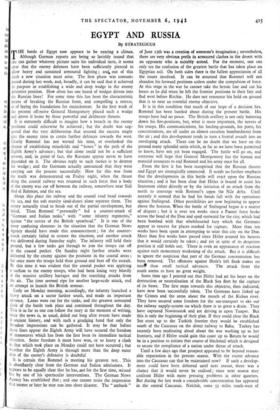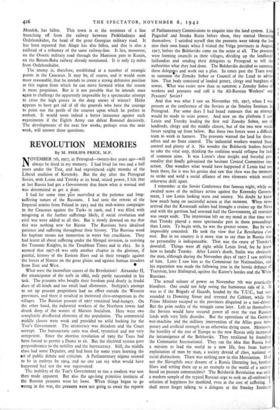EGYPT AND RUSSIA
By STRATEGICUS
rfHE battle of Egypt now appears to be nearing a climax. Although German reports are being so lavishly issued that one can gather whatever picture suits his individual taste, it seems clear that the enemy defences have been sufficiently pierced to allow heavy and sustained armoured fighting ; and, out of this clash a new situation must arise. The first phase was consum- mated during last week, and, broadly, it can be said that it achieved
its purpose in establishing a wide and deep wedge in the enemy defensive position. How often has one heard of wedges driven into
the Russian lines! For some time this has been the characteristic means of breaking the Russian front, and compelling a retreat, or of laying the foundations for encirclement. In the first week of the present offensive General Montgomery placed such a wedge and drove it home by three powerful and deliberate thrusts.
It is extremely difficult to imagine how a breach in the enemy positions could otherwise be achieved ; but the doubt was sug- gested that the very deliberation that assured the success might zive the enemy time to create further defences towards the west. Clearly Rommel has not wasted his time, or overlooked the chance of establishing minefields and "boxes" in the path of the ighth Army's advance; but that alone could not be a sufficient answer, and, in point of fact, the Russians appear never to have depended on it. The obvious reply to such tactics is to destroy the wedge ; and the Germans actually announced that they were carrying out the process successfully. How far this was from the truth was demonstrated on Friday night, when the thrust along the coastal railway was resumed in such force that a body of the enemy was cut off between the railway, somewhere near Sidi Abd el Rahman, and the sea.
About this place the railway and the ,coastal road bend towards the sea, and the soft marshy sand-dunes alone separate them. The enemy naturally tried to break out of the partial envelopment, but failed. Then Rommel " personally " led a counter-attack of "German and Italian tanks," with "some infantry regiments," against "the centre of the British spearhead." It is one of the many confusing elements in the situation that the German News Agency should have made this announcement ; for the counter- attack certainly failed to restore the situation, and another attack was delivered during Saturday night. The infantry still held their ground, but a few tanks got through to join the troops cut off in the coastal pocket. On Sunday night further attacks were delivered by the enemy against the positions in the coastal areas ; but once more the troops held their ground and beat off the assault. By this time it was evident that the coastal pocket was applying a suction to the enemy troops, who had been losing very heavily in the massive artillery barrages and the searching attacks from the air. The time seemed ripe for another large-scale attack, and an attempt to launch the British armour.
Early on Monday morning, accordingly, the infantry launched a heavy attack on a sector farther south, and made an important advance. Lanes were cut for the tanks, and the greatest armoured clash of the battle took place and continued throughout the day. This is as far as one can follow the story at the moment of writing, since the news is, as usual, doled out long after events have made it ancient history, and with such a grudging hand that only the broadest impressions can be gathered. It may be that before these lines appear the .Fighth Army will have secured the freedom of manoeuvre which has from the first been its immediate tactical obiective. Some freedom it must have won, or so heavy a clash as that which took place on Monday could not have occurred ; but waether the Eighth Army is through more than the deep outer skin of the enemy's defensive is doubtful It is certain that Rommel is meeting his greatest test. This is abundantly clear from the German and Italian admissions. It appears to be equally clear that he has, ..not for the first time, missed fire by one of his spectacular interventions. The German News Agency has established that ; and one cannot resist the impression that sooner or later he may run into sheer disaster. The " ambush "
of June 13th was a creation of someone's imagination ; nevertheless, there are very obvious perils in armoured clashes in the desert with an opponent who is suitably armcd. For the moment, one can only see the confusion of the greatest battle that has taken place on Egyptian soil. On both sides there is the fullest appreciation of all the issues involved. It can be assumed that Rommel will not abandon his forward positions unless under the compulsion of force. At this stage in the war he cannot take the heroic line and cut his losses as he did when he left the frontier positions to their fate and fled west before Ritchie. He dare not renounce his hold on ground that is so near an essential enemy objective.
It is in this condition that much of our hope of a decision lies. Rommel has been bustled about during the present battle. His troops have had no peace. The British artillery is not only battering down his fire-positions, but, what is more important, the nerves of his troops. His communications, his landing-grounds, his ports, his concentrations, are all under an almost ceaseless bombardment from the air ; and this development tends to turn a frontal assault into an enveloping attack. There can be no doubt that we have on the ground many splendid units which, as far as we have been permitted to know, have not yet been engaged. The battle will go on, and everyone will hope that General Montgomery has the human and material resources to end Rommel and his army once for all.
From the first it has been recognised that the Russian theatre and Egypt are strategically connected. It needs no further emphasis that the developments in this battle will react upon the Russian situation ; and it has been clear that Hitler is hound to assist his lieutenant either directly or by the initiation of an attack from the north to converge with Rommel's upon the Nile delta. Until recently it seemed that he had his hands full with the operations against Stalingrad. Other possibilities are now beginning to appear above the horizon. When the battle of Stalingrad began is a matter of dispute ; but it is over ten weeks since a Panzer force broke across the bend of the Don and sped eastward for the city, which had been bombed with that wholehearted fury which the Germans appear to reserve for places marked for capture. More than ten weeks have been spent in attempting to seize this city on the Don. More than five weeks have passed since Hitler assured his hearers that it would certainly be taken ; and yet in spite of its desperate position it still holds out. There is even an appearance of reaction against each momentary weakening of the attack. But it is difficult to ignore the suspicion that part of the German concentration has been removed. The offensive against Hoth's left flank makes no molt than small tactical advances. The attack from the south seems to have no great weight.
Some time ago I pointed out that Hitler had set his heart on the destruction or neutralisation of the Black Sea fleet by the capture of its bases. The first steps towards this objective, then indicated, have now been successfully taken. The Germans have linked up the Crimea and the areas about the mouth of the Kuban river. They have secured some freedom for the sea-transport to eke out the railway supply-system on which there is so great a drain. They have captured Novorossisk and are driving in upon Tuapse. But this is only the beginning of their plan. If they could clear the Black Sea coast up to the Turkish frontier they would be established south of the Caucasus on the direct railway to Baku. Turkey has recently been meditating aloud about the war washing up to her frontiers, and if Hitler could gain this coast up to Batum he would be in a position to initiate that course of blackmail which is designed to secure the compliance of a nation under threat of attack.
Until a few days ago that prospect appeared to be beyond reason- able expectation in the present season. With the recent advance into the Caucasus can that be maintained now? If such a develop- ment could have been deferred until next season, there was a chance that it would never be realised ; since next season may confront Hitler with more pressing problems in other quarters. But during the last week a considerable concentration has appeared in the central Caucasus. Nalchik, some 55 miles south-west of Mozdok, has fallen. This town is at the terminus of a line branching off from the railway between Prolehladnaya and Ordzhonikidze, the head of the great Georgian military road. It has been reported that Alagir has also fallen, and this is also a railhead of a tributary of the same railway-line. It lies, moreover, on the Ossetic military road through the Mamison pass to Kutais, on the Batum-Baku railway already mentioned. It is only 23 miles from Ordzhonikidze.
The enemy is, therefore, established at a number of strategic points in the Caucasus. It may be, of course, and it would seem more reasonable, that he intends to create a strong defensive position in this region from which he can move forward when the season is more propitious. But is it not possible that he intends once again to challenge the apparently impossible by a spectacular attempt to cross the high passes in the deep snows of winter? Hitler appears to have got rid of all the generals who have the courage to point out the perils of the courses upon which he prefers to embark. It would seem indeed a better insurance against such experiments if the Eighth Army can defeat Rommel decisively. The developments of the next few weeks, perhaps even the next week, will answer these questions.



























 Previous page
Previous page